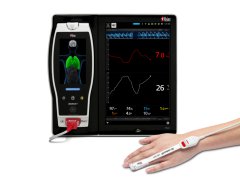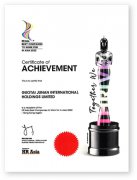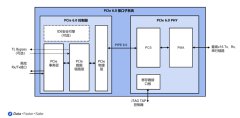The Phase 3 GRAPHITE Study Met Its Primary Efficacy Endpoint of Significant and Clinically Meaningful Intestinal aGvHD-Free Survival as Compared to Placebo by Day 180 after Allo-HSCT (p<0.001)
No New Safety Signals Were Seen with Vedolizumab Compared with Placebo in Patients Who Received Allo-HSCT
Data Were Presented as A Late-Breaking Abstract at The 2023 Tandem Meetings | Transplantation & Cellular Therapy Meetings of the American Society for Transplantation and Cellular Therapy (ASTCT) and the Center for International Blood & Marrow Transplant Research (CIBMTR)
OSAKA, Japan & CAMBRIDGE, Mass. -- (BUSINESS WIRE) --
Takeda (TSE:4502/NYSE:TAK) today announced late-breaking data from the Phase 3 GRAPHITE study presented at the 2023 Tandem Meetings, demonstrating vedolizumab achieved a statistically significant and clinically meaningful improvement in lower gastrointestinal (GI) aGvHD-free survival by Day 180 after allo-HSCT with no relevant differences in safety profile versus placebo.1 Intestinal aGvHD is a serious complication characterized by inflammation of the GI tract which can affect patients undergoing allo-HSCT, a common treatment for blood cancers.
“Lower GI aGvHD represents a critical unmet need in patients undergoing allo-HSCT,” said Yi-Bin Chen, MD, Director, Hematopoietic Cell Transplant & Cell Therapy Program, Mass General Cancer Center. “I’m excited that this study can contribute to the understanding of this common and life-threatening complication in stem cell transplantation.”
Vedolizumab is not currently indicated for use in aGvHD.
The Phase 3, randomized, double-blind, placebo-controlled, multicenter GRAPHITE study evaluated the efficacy and safety of vedolizumab as prophylaxis for intestinal aGvHD in patients undergoing allo-HSCT from unrelated donors for the treatment of hematological malignancies. The study met its primary endpoint, with vedolizumab achieving a statistically significant improvement in intestinal aGvHD-free survival versus placebo by Day 180 after allo-HSCT (85.5% of patients in the vedolizumab arm versus 70.9% in the placebo arm [HR=0.45; 95% CI: 0.27, 0.73; p<0.001]).1 Statistically significant superiority of vedolizumab over placebo was also demonstrated for intestinal aGvHD-free and relapse-free survival by Day +180 (HR= 0.56, 95% CI: 0.37, 0.86; p = 0.0043), and for Grade C-D aGvHD-free (with any organ involvement) survival at Day +180 (HR: 0.59, 95% CI: 0.39, 0.91; p = 0.0204).1 In addition, no relevant differences in safety profile between the vedolizumab and placebo arms were observed, and no new safety signals were identified. Treatment-related adverse events were reported in 24.8% versus 28.4%, and treatment related serious adverse events in 8.5% versus 6.5% of patients treated with placebo versus vedolizumab, respectively. The most common adverse events of special interest were hypersensitivity reactions (placebo 82.4%, vedolizumab 79.3%), serious infections (placebo 67.3%, vedolizumab 74.0%), and liver injury (placebo 41.8%, vedolizumab 40.2%).1
“These results have advanced our understanding of vedolizumab, currently indicated for IBD, in another critical GI inflammatory condition,” said Chinwe Ukomadu, M.D., Ph.D., Head, Gastroenterology Therapeutic Area Unit at Takeda. “Our Phase 3 study in the prevention of lower GI aGvHD is the latest example of Takeda’s commitment to advancing the science of vedolizumab, furthering the understanding of its mechanism of action, and exploring new ways to help patients.”
Intestinal aGvHD can occur after stem cell transplantation when the immune cells of the donor (the graft) consider the recipient’s body (the host) as foreign and attack the organs and tissue.2 Intestinal aGvHD results in the majority of morbidity and mortality associated with GvHD. Effective prevention of aGvHD, especially with lower intestinal involvement, has been an important treatment goal for physicians when patients are undergoing allo-HSCT.3
About the GRAPHITE Study
GRAPHITE (vedolizumab-3035) is a randomized, double-blind, placebo controlled study designed to evaluate the use of vedolizumab as prophylaxis of intestinal aGvHD in participants who receive allo-HSCT as treatment for a hematologic malignancy or myeloproliferative disorder from an unrelated donor.1 The study enrolled 333 patients who were randomly assigned in a 1:1 ratio to one of two treatment groups receiving either an intravenous infusion of vedolizumab 300 mg or placebo on days -1 (before allo-HSCT), and on days +13, +41, +69, +97, +125, and +153 following allo-HSCT, alongside a background GvHD prophylaxis regimen. The overall time of participation in the study was 12 months.4
About vedolizumab (Entyvio®)
Vedolizumab is a gut-selective anti-lymphocyte therapy and is approved in both intravenous (IV) and subcutaneous (SC) formulations (approvals vary by market; vedolizumab is not currently approved in the SC formulation in the U.S.).5,6 It is a humanized monoclonal antibody designed to specifically antagonize the alpha4beta7 integrin, inhibiting the binding of alpha4beta7 integrin to intestinal mucosal addressin cell adhesion molecule 1 (MAdCAM-1), but not vascular cell adhesion molecule 1 (VCAM-1).7 MAdCAM-1 is preferentially expressed on blood vessels and lymph nodes of the gastrointestinal tract.8 The alpha4beta7 integrin is expressed on a subset of circulating white blood cells.7 These cells have been shown to play a role in mediating the inflammatory process in ulcerative colitis (UC) and Crohn’s disease (CD).7,9,10 By inhibiting alpha4beta7 integrin, vedolizumab may limit the ability of certain white blood cells to infiltrate gut tissues.7
Vedolizumab is approved for the treatment of adult patients with moderately to severely active UC and CD, who have had an inadequate response with, lost response to, or were intolerant to either conventional therapy or a tumor necrosis factor-alpha (TNFα)-antagonist.5,6 Vedolizumab IV has been granted marketing authorization in over 70 countries, including the United States and European Union, with more than 1,000,000 patient years of exposure to date.11 Vedolizumab SC has been granted marketing authorization in the European Union and over 50 countries.
Takeda’s Commitment to Transplantation
Transplants are precious, life-saving interventions, but serious post-transplant conditions, including cytomegalovirus (CMV) and GvHD, present significant challenges for transplant recipients. At Takeda, we recognize that the prevention, diagnosis, and management of post-transplant conditions are critically important, yet often overlooked, facets of transplant medicine. We are driven by these significant unmet needs to develop transformative therapies for transplant patients around the world.
Takeda’s Commitment to Gastroenterology
We believe that gastrointestinal (GI) and liver diseases are not just life disrupting conditions, but diseases that can impact a patient’s quality of life. Beyond a fundamental need for effective treatment options, we understand that improving patients’ lives also depends on their needs being recognized. With nearly 30 years of experience in gastroenterology, Takeda has made significant strides in addressing patient needs with treatments for inflammatory bowel disease (IBD, acid-related diseases, short bowel syndrome (SBS), and motility disorders. We are making significant strides toward closing the gap on new areas of unmet need. Together with researchers, patient groups and more, we are working to advance scientific research and clinical medicine in GI.
Therapeutic Indications for vedolizumab
Ulcerative Colitis
Vedolizumab is indicated for the treatment of adult patients with moderately to severely active ulcerative colitis who have had an inadequate response with, lost response to, or were intolerant to either conventional therapy or a tumor necrosis factor-alpha (TNFα) antagonist.
Crohn’s Disease
Vedolizumab is indicated for the treatment of adult patients with moderately to severely active Crohn’s disease who have had an inadequate response with, lost response to, or were intolerant to either conventional therapy or a tumor necrosis factor-alpha (TNFα) antagonist.
Pouchitis
Vedolizumab IV is indicated in the EU for the treatment of adult patients with moderately to severely active chronic pouchitis, who have undergone proctocolectomy and ileal pouch-anal anastomosis (IPAA) for ulcerative colitis (UC) and have had an inadequate response with or lost response to antibiotic therapy.
Important Safety Information for vedolizumab
Contraindications
Hypersensitivity (such as dyspnea, bronchospasm, urticaria, flushing and increased heart rate) to the active substance or to any of the excipients.
Special Warnings and Special Precautions for Use
Intravenous vedolizumab should be administered by a healthcare professional prepared to manage hypersensitivity reactions, including anaphylaxis, if they occur. Appropriate monitoring and medical support measures should be available for immediate use when administering intravenous vedolizumab. Observe patients during infusion and until the infusion is complete.
Infusion-related reactions and Hypersensitivity Reactions
In clinical studies, infusion-related reactions (IRR) and hypersensitivity reactions have been reported, with the majority being mild to moderate in severity. If a severe IRR, anaphylactic reaction, or other severe reaction occurs, administration of vedolizumab must be discontinued immediately and appropriate treatment initiated (e.g., epinephrine and antihistamines). If a mild to moderate IRR occurs, the infusion rate can be slowed or interrupted and appropriate treatment initiated (e.g., epinephrine and antihistamines). Once the mild or moderate IRR subsides, continue the infusion. Physicians should consider pre-treatment (e.g., with antihistamine, hydrocortisone and/or paracetamol) prior to the next infusion for patients with a history of mild to moderate IRR to vedolizumab, in order to minimize their risks.
Injection Site Reactions (subcutaneous vedolizumab)
No clinically relevant differences in the overall safety profile and adverse events were observed in patients who received subcutaneous vedolizumab compared to the safety profile observed in clinical studies with intravenous vedolizumab with the exception of injection site reactions (with subcutaneous administration only). Injection-site reactions were mild or moderate in intensity, and none were reported as serious.
Infections
Vedolizumab is a gut-selective integrin antagonist with no identified systemic immunosuppressive activity. Physicians should be aware of the potential increased risk of opportunistic infections or infections for which the gut is a defensive barrier. Vedolizumab treatment is not to be initiated in patients with active, severe infections such as tuberculosis, sepsis, cytomegalovirus, listeriosis, and opportunistic infections until the infections are controlled, and physicians should consider withholding treatment in patients who develop a severe infection while on chronic treatment with vedolizumab. Caution should be exercised when considering the use of vedolizumab in patients with a controlled chronic severe infection or a history of recurring severe infections. Patients should be monitored closely for infections before, during and after treatment. Before starting treatment with vedolizumab, screening for tuberculosis may be considered according to local practice. Some integrin antagonists and some systemic immunosuppressive agents have been associated with progressive multifocal leukoencephalopathy (PML), which is a rare and often fatal opportunistic infection caused by the John Cunningham (JC) virus. By binding to the α4β7 integrin expressed on gut-homing lymphocytes, vedolizumab exerts an immunosuppressive effect specific to the gut. No systemic immunosuppressive effect was noted in healthy subjects. Healthcare professionals should monitor patients on vedolizumab for any new onset or worsening of neurological signs and symptoms, and consider neurological referral if they occur. If PML is suspected, treatment with vedolizumab must be withheld; if confirmed, treatment must be permanently discontinued. Typical signs and symptoms associated with PML are diverse, progress over days to weeks, and include progressive weakness on one side of the body, clumsiness of limbs, disturbance of vision, and changes in thinking, memory, and orientation leading to confusion and personality changes. The progression of deficits usually leads to death or severe disability over weeks or months.
Malignancies
The risk of malignancy is increased in patients with ulcerative colitis and Crohn’s disease. Immunomodulatory medicinal products may increase the risk of malignancy.
Prior and concurrent use of biological products
No vedolizumab clinical trial data are available for patients previously treated with natalizumab. No clinical trial data for concomitant use of vedolizumab with biologic immunosuppressants are available. Therefore, the use of vedolizumab in such patients is not recommended.
Vaccinations
Prior to initiating treatment with vedolizumab all patients should be brought up to date with all recommended immunizations. Patients receiving vedolizumab may receive non-live vaccines (e.g., subunit or inactivated vaccines) and may receive live vaccines only if the benefits outweigh the risks.
Adverse reactions include: nasopharyngitis, headache, arthralgia, upper respiratory tract infection, bronchitis, influenza, sinusitis, cough, oropharyngeal pain, nausea, rash, pruritus, back pain, pain in extremities, pyrexia, fatigue, injection site reactions and anaphylaxis.
Please consult with your local regulatory agency for approved labeling in your country.
For EU audiences, please see the Summary of Product Characteristics (SmPC) for ENTYVIO®.
For U.S. audiences, please see the full Prescribing Information, including Medication Guide for ENTYVIO® IV.
About Takeda
Takeda is a global, values-based, R&D-driven biopharmaceutical leader headquartered in Japan, committed to discover and deliver life-transforming treatments, guided by our commitment to patients, our people and the planet. Takeda focuses its R&D efforts on four therapeutic areas: Oncology, Rare Genetics and Hematology, Neuroscience, and Gastroenterology (GI), with expertise in immune and inflammatory diseases. We also make targeted R&D investments in Plasma-Derived Therapies and Vaccines. We are focusing on developing highly innovative medicines that contribute to making a difference in people’s lives by advancing the frontier of new treatment options and leveraging our enhanced collaborative R&D engine and capabilities to create a robust, modality-diverse pipeline. Our employees are committed to improving quality of life for patients and to working with our partners in health care in approximately 80 countries and regions. For more information, visit https://www.takeda.com.
Important Notice
For the purposes of this notice, “press release” means this document, any oral presentation, any question and answer session and any written or oral material discussed or distributed by Takeda Pharmaceutical Company Limited (“Takeda”) regarding this release. This press release (including any oral briefing and any question-and-answer in connection with it) is not intended to, and does not constitute, represent or form part of any offer, invitation or solicitation of any offer to purchase, otherwise acquire, subscribe for, exchange, sell or otherwise dispose of, any securities or the solicitation of any vote or approval in any jurisdiction. No shares or other securities are being offered to the public by means of this press release. No offering of securities shall be made in the United States except pursuant to registration under the U.S. Securities Act of 1933, as amended, or an exemption therefrom. This press release is being given (together with any further information which may be provided to the recipient) on the condition that it is for use by the recipient for information purposes only (and not for the evaluation of any investment, acquisition, disposal or any other transaction). Any failure to comply with these restrictions may constitute a violation of applicable securities laws.
The companies in which Takeda directly and indirectly owns investments are separate entities. In this press release, “Takeda” is sometimes used for convenience where references are made to Takeda and its subsidiaries in general. Likewise, the words “we”, “us” and “our” are also used to refer to subsidiaries in general or to those who work for them. These expressions are also used where no useful purpose is served by identifying the particular company or companies.
Forward-Looking Statements
This press release and any materials distributed in connection with this press release may contain forward-looking statements, beliefs or opinions regarding Takeda’s future business, future position and results of operations, including estimates, forecasts, targets and plans for Takeda. Without limitation, forward-looking statements often include words such as “targets”, “plans”, “believes”, “hopes”, “continues”, “expects”, “aims”, “intends”, “ensures”, “will”, “may”, “should”, “would”, “could” “anticipates”, “estimates”, “projects” or similar expressions or the negative thereof. These forward-looking statements are based on assumptions about many important factors, including the following, which could cause actual results to differ materially from those expressed or implied by the forward-looking statements: the economic circumstances surrounding Takeda’s global business, including general economic conditions in Japan and the United States; competitive pressures and developments; changes to applicable laws and regulations, including global health care reforms; challenges inherent in new product development, including uncertainty of clinical success and decisions of regulatory authorities and the timing thereof; uncertainty of commercial success for new and existing products; manufacturing difficulties or delays; fluctuations in interest and currency exchange rates; claims or concerns regarding the safety or efficacy of marketed products or product candidates; the impact of health crises, like the novel coronavirus pandemic, on Takeda and its customers and suppliers, including foreign governments in countries in which Takeda operates, or on other facets of its business; the timing and impact of post-merger integration efforts with acquired companies; the ability to divest assets that are not core to Takeda’s operations and the timing of any such divestment(s); and other factors identified in Takeda’s most recent Annual Report on Form 20-F and Takeda’s other reports filed with the U.S. Securities and Exchange Commission, available on Takeda’s website at: https://www.takeda.com/investors/sec-filings/ or at www.sec.gov. Takeda does not undertake to update any of the forward-looking statements contained in this press release or any other forward-looking statements it may make, except as required by law or stock exchange rule. Past performance is not an indicator of future results and the results or statements of Takeda in this press release may not be indicative of, and are not an estimate, forecast, guarantee or projection of Takeda’s future results.
Medical information
This press release contains information about products that may not be available in all countries, or may be available under different trademarks, for different indications, in different dosages, or in different strengths. Nothing contained herein should be considered a solicitation, promotion or advertisement for any prescription drugs including the ones under development.
References
1 Chen YB, Mohty M, Zeiser R, et al. Vedolizumab for Prophylaxis of Lower Gastrointestinal (GI) Acute Graft-versus-Host Disease (aGvHD) After Allogeneic Hematopoietic Stem Cell Transplantation (allo-HSCT) From Unrelated Donors: Results of A Phase 3, Randomized, Double-Blind, Placebo-Controlled, Multicenter Study (GRAPHITE). Abstract #LBA2. Presented at the Transplantation & Cellular Therapy Meetings of the American Society for Transplantation and Cellular Therapy (ASTCT) and the Center for International Blood & Marrow Transplant Research (CIBMTR) 2023.
2 Naserian S, Leclerc M, Shamdani S, et al. Current Preventions and Treatments of aGVHD: From Pharmacological Prophylaxis to Innovative Therapies. Front Immunol. 2020;11:607030.
3 Chen YB, Shah NN, Renteria AS, et al. Vedolizumab for prevention of graft-versus-host disease (GvHD) after allogeneic hematopoietic stem cell transplantation. Blood Adv. 2019;3(23):4136-4146.
4 Vedolizumab in the Prophylaxis of Intestinal Acute Graft Versus Host Disease (aGVHD) in Participants Undergoing Allogeneic Hematopoietic Stem Cell (Allo-HSCT) Transplantation. Available at: https://clinicaltrials.gov/ct2/show/NCT03657160 Last updated: November 3 , 2022. Last accessed: February 2023.
5 Entyvio EPAR _ 29/09/2022 Entyvio - EMEA/H/C/002782 - II/0070/G_ European Medicines Agency - Entyvio _ Annex I Summary of product characteristics. Committee For Medicinal Products For Human Use. Available at: https://www.ema.europa.eu/en/medicines/human/EPAR/entyvio. Last updated: October 2022. Last accessed: February 2023.
6 Entyvio Prescribing Information. Available at: https://general.takedapharm.com/ENTYVIOPI. Last updated: June 2022. Last accessed: February 2023.
7 Soler D, Chapman T, Yang LL, et al. The binding specificity and selective antagonism of vedolizumab, an anti-α4β7 integrin therapeutic antibody in development for inflammatory bowel diseases. J Pharmacol Exp Ther. 2009;330:864-875.
8 Briskin M, Winsor-Hines D, Shyjan A, et al. Human mucosal addressin cell adhesion molecule-1 is preferentially expressed in intestinal tract and associated lymphoid tissue. Am J Pathol. 1997;151:97110.
9 Eksteen B, Liaskou E, Adams DH. Lymphocyte homing and its roles in the pathogenesis of IBD. Inflamm Bowel Dis. 2008;14:12981312.
10 Wyant T, Fedyk E, Abhyankar B. An overview of the mechanism of action of the monoclonal antibody vedolizumab. J Crohns Colitis. 2016;10:1437-1444.
11 Takeda data on file (VV-SUP-91507): Vedolizumab Patient Exposure from Marketing Experience. 2021.
View source version on businesswire.com: https://www.businesswire.com/news/home/20230218005025/en/
CONTACT:
Japanese Media
Jun Saito
jun.saito@takeda.com
U.S. and International Media
Megan Ostrower
megan.ostrower@takeda.com
+1 772-559-4924







